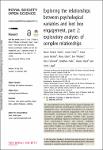Exploring the relationships between psychological variables and loot box engagement, part 2: exploratory analyses of complex relationships
| dc.contributor.author | Spicer, SG | |
| dc.contributor.author | Close, J | |
| dc.contributor.author | Nicklin, LL | |
| dc.contributor.author | Uther, M | |
| dc.contributor.author | Whalley, B | |
| dc.contributor.author | Fullwood, C | |
| dc.contributor.author | Parke, J | |
| dc.contributor.author | Lloyd, J | |
| dc.contributor.author | Lloyd, H | |
| dc.date.accessioned | 2024-01-04T16:01:53Z | |
| dc.date.available | 2024-01-04T16:01:53Z | |
| dc.date.issued | 2024-01 | |
| dc.identifier.issn | 2054-5703 | |
| dc.identifier.issn | 2054-5703 | |
| dc.identifier.other | ARTN 231046 | |
| dc.identifier.uri | https://pearl.plymouth.ac.uk/handle/10026.1/21874 | |
| dc.description.abstract |
In a pre-registered survey linked to this paper (Exploring the relationships between psychological variables and loot box engagement, part 1: pre-registered hypotheses), we confirmed bivariate associations between engagement with loot boxes (purchasable randomized rewards in video games) and measures of problem gambling, problem video gaming, impulsivity, gambling cognitions, experiences of game-related ‘flow’, psychological distress and reduced wellbeing. However, these variables have complex relationships, so to gain further insights, we analysed the dataset (1495 gamers who purchase loot boxes and 1223 purchasers of non-randomized content) in a series of Bayesian mixed-effects multiple regressions with a zero-inflation component. The results challenge some well-established results in the literature, including associations between loot box engagement and problematic gambling measures, instead suggesting that this relationship might be underpinned by shared variance with problem video gaming and gambling-related cognitions. An entirely novel discovery revealed a complex interaction between experiences of flow and loot box engagement. Distress and wellbeing are both (somewhat contradictorily) predictive of participants engaging with loot boxes, but neither correlate with increasing loot box risky engagement/spend (among those who engage). Our findings unravel some of the nuances underpinning loot box engagement, yet remain consistent with narratives that policy action on loot boxes will have benefits for harm minimization. | |
| dc.format.extent | 231046- | |
| dc.format.medium | Electronic-eCollection | |
| dc.language | en | |
| dc.publisher | The Royal Society | |
| dc.subject | loot boxes | |
| dc.subject | video gaming | |
| dc.subject | gambling | |
| dc.subject | digital harms | |
| dc.subject | addictive behaviours | |
| dc.subject | wellbeing | |
| dc.title | Exploring the relationships between psychological variables and loot box engagement, part 2: exploratory analyses of complex relationships | |
| dc.type | journal-article | |
| dc.type | Article | |
| plymouth.author-url | https://www.ncbi.nlm.nih.gov/pubmed/38179078 | |
| plymouth.issue | 1 | |
| plymouth.volume | 11 | |
| plymouth.publication-status | Published | |
| plymouth.journal | Royal Society Open Science | |
| dc.identifier.doi | 10.1098/rsos.231046 | |
| plymouth.organisational-group | |Plymouth | |
| plymouth.organisational-group | |Plymouth|Research Groups | |
| plymouth.organisational-group | |Plymouth|Faculty of Health | |
| plymouth.organisational-group | |Plymouth|REF 2021 Researchers by UoA | |
| plymouth.organisational-group | |Plymouth|Users by role | |
| plymouth.organisational-group | |Plymouth|Users by role|Academics | |
| plymouth.organisational-group | |Plymouth|REF 2021 Researchers by UoA|UoA04 Psychology, Psychiatry and Neuroscience | |
| plymouth.organisational-group | |Plymouth|Faculty of Health|Peninsula Medical School | |
| plymouth.organisational-group | |Plymouth|Research Groups|FoH - Community and Primary Care | |
| plymouth.organisational-group | |Plymouth|Research Groups|Plymouth Institute of Health and Care Research (PIHR) | |
| plymouth.organisational-group | |Plymouth|REF 2028 Researchers by UoA | |
| plymouth.organisational-group | |Plymouth|REF 2028 Researchers by UoA|UoA02 Public Health, Health Services and Primary Care | |
| plymouth.organisational-group | |Plymouth|REF 2028 Researchers by UoA|UoA04 Psychology, Psychiatry and Neuroscience | |
| dc.publisher.place | England | |
| dcterms.dateAccepted | 2023-11-27 | |
| dc.date.updated | 2024-01-04T16:01:52Z | |
| dc.rights.embargodate | 2024-1-6 | |
| dc.identifier.eissn | 2054-5703 | |
| rioxxterms.versionofrecord | 10.1098/rsos.231046 |


